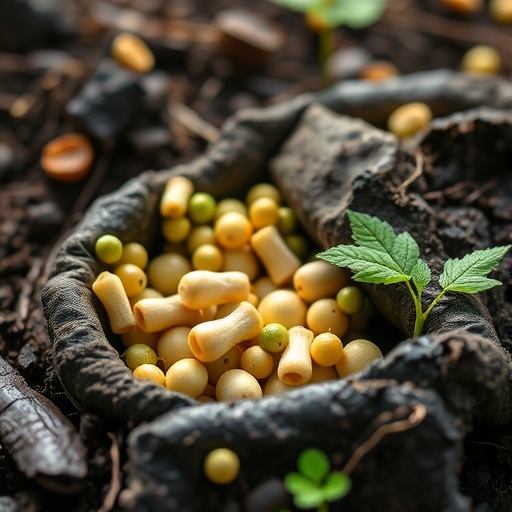In a significant advancement within the realm of environmental microbiology, researchers have unveiled vital mechanisms through which two genera of bacteria, Enterobacter and Bacillus, actively participate in enhancing aerobic composting processes while simultaneously aiding in the immobilization of cadmium (Cd) from livestock and poultry manure. Published in the journal ‘International Microbiology’, this groundbreaking study not only sheds light on the intricate relationships between microbial life and waste management strategies but also highlights the broader implications for sustainable agriculture and environmental remediation.
The improper disposal and management of livestock and poultry manure pose a substantial threat to the environment. Heavy metal contamination, particularly from cadmium, can lead to toxic accumulation in soils, adversely impacting plant growth and entering the food chain. The study emphasizes that regardless of their benefits in agricultural practices, animal waste can become a significant liability when it harbors heavy metals. However, by harnessing the power of microorganisms, particularly Enterobacter and Bacillus spp., there is potential for a transformative approach to waste management and environmental recovery.
Enterobacter and Bacillus are well-documented for their roles in various biochemical processes, including nitrogen fixation and organic matter decomposition. In this research, the focus was placed on understanding how these bacteria can enhance aerobic composting—the process wherein organic waste decomposes through the action of microorganisms in the presence of oxygen. The authors meticulously examined how these bacterial genera contribute to the breakdown of organic materials during composting, resulting in enhanced nutrient availability and improved soil quality.
Moreover, the study explored the phenomenon of immobilization of cadmium, a metal renowned for its toxicity and persistence in the environment. The researchers found that the metabolic activities of Enterobacter and Bacillus not only accelerated the composting process but also facilitated the transformation of soluble cadmium into less bioavailable forms. This immobilization process is crucial as it reduces the risk of cadmium uptake by plants, thus safeguarding food sources and maintaining soil health.
In their experimental setup, the researchers employed various techniques to analyze the composting process, including microbial community profiling and chemical analysis of the composted materials. These methods revealed that the presence of Enterobacter and Bacillus significantly altered the microbial community composition within the compost, promoting a diverse range of microorganisms that collaborate synergistically to enhance the efficiency of the composting process. By fostering a robust microbial ecosystem, these bacteria not only speed up the decomposition of organic matter but also improve the overall quality of the compost produced.
The implications of this research extend beyond mere compost quality; they touch upon the principles of circular economy and sustainable agriculture. By integrating microbial solutions into waste management practices, farmers can create organic fertilizers that not only enrich the soil but also mitigate the risks posed by heavy metal contamination. This approach aligns with global efforts to promote sustainable agricultural practices and safeguard food security, particularly in regions heavily reliant on livestock farming.
To further contextualize these findings, the study also highlights the potential for biotechnological applications. The ability of Enterobacter and Bacillus to thrive in environments rich in organic waste suggests that these bacteria could be harnessed for large-scale bioremediation efforts. By inoculating compost piles with specific strains of these bacteria, it may be possible to engineer composting systems that are even more efficient at breaking down organic matter and immobilizing toxic heavy metals.
Furthermore, the study calls for future investigations to explore the genetic and enzymatic mechanisms underpinning the interactions between Enterobacter, Bacillus, and the organic materials present in livestock manure. Understanding the specific genes and metabolic pathways involved could pave the way for the development of bioengineered strains with enhanced capabilities, thus revolutionizing composting techniques and environmental cleanup efforts.
Finally, this research underscores the critical role of microbiology in addressing some of the pressing environmental challenges of our time. As the global population continues to rise and sustainable food production becomes increasingly vital, the integration of microbial science into agricultural practices could serve as a catalyst for change. The findings from Mao et al. present an exciting outlook on how the tiny world of bacteria can yield substantial benefits for our ecosystems and agricultural systems alike.
In conclusion, the study on the roles of Enterobacter and Bacillus in promoting aerobic composting and immobilizing cadmium from livestock and poultry manure opens various avenues for research and practical applications. By embracing microbial solutions and innovations in waste management, we can aspire to create a sustainable future that harmonizes agricultural productivity with environmental stewardship.
Subject of Research: Mechanisms of Enterobacter and Bacillus in promoting aerobic composting and immobilization of Cadmium in livestock and poultry manure.
Article Title: Mechanisms of Enterobacter and Bacillus in promoting aerobic composting and immobilization of Cd in livestock and poultry manure.
Article References:
Mao, X., Li, W., Xu, D. et al. Mechanisms of Enterobacter and Bacillus in promoting aerobic composting and immobilization of Cd in livestock and poultry manure.
Int Microbiol (2025). https://doi.org/10.1007/s10123-025-00730-y
Image Credits: AI Generated
DOI: https://doi.org/10.1007/s10123-025-00730-y
Keywords: Environmental microbiology, sustainable agriculture, composting, Enterobacter, Bacillus, cadmium immobilization, livestock manure, microbial ecology.




